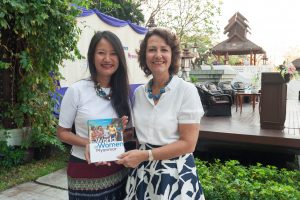Interview with the Myanmar Times: “Discovering the world through the eyes of women”
Carin Salerno’s second interview with the Myanmar Times reveals why and how The World of Women collection was launched.
By Nandar Aung, Friday 20 January 2017
Carin Salerno is no stranger to travelling: A self-confessed globe-trotter, her work with NGOs has taken her to far-flung corners of the earth for the past 20 years. But it was only after a friend returned home from a holiday in Ethiopia that Salerno realised something was missing from her memories of the countries she had visited:
Women.
“My friend said she had seen a lot of men. The tour guides, shopkeepers, taxi drivers and everyone she interacted with were men … When you visit a country you don’t find out anything about the reality of women. There is nothing about the reality of women in travel literature, in the guide books,” said Salerno, who is originally from Switzerland.
As co-director of Women in Action Worldwide, a non-profit organisation that works to promote the empowerment of women around the world, Salerno decided it was time women were given in a voice in travel literature. In 2015 she launched The World of Women book collection, highlighting the unique role and contribution of women in their countries. The first edition, The World of Women Tanzania, produced with co-author Elisabeth Thorens, went on to win the Zonta Lausanne creation award at the 2015 Geneva Book and Press Fair.
In December last year, Salerno launched her second book, The World of Women Myanmar, featuring photographs of women in Myanmar taken by her husband, Giuseppe Salerno.
“The idea is to discover Myanmar through the eyes and experiences of inspiring women,” said Salerno, whose third book, The World of Women Switzerland, will be published in March.
“I want women the world over to be inspired and empowered by reading the stories of courageous women; change-makers who are passionately committed to progress, peace and democracy in Myanmar.”
The book features five main tourist destinations in Myanmar: Yangon, Mandalay, Bagan, Inle Lake and Ngwe Saung. During her research for the book, Salerno interviewed women from a broad range of backgrounds and ethnic groups including fisherwomen, nuns, entrepreneurs, artists, managers, activists and farmers.
“Some of the women were too shy to talk to me at first, but after a while I got them talking,” she said. “Translation was a problem – particularly with Moken women in Tanintharyi Region. I was really surprised that they all have such interesting stories to tell. I hope readers will discover the country and get inspired by these women’s life journeys.”
“Of course some of the women in the book don’t need me to spread their stories because they are already quite well known,” Salerno added. “But I wanted to hear the other women’s voices. My passion is really to give their voices to the readers. By talking to the women I’ve learned so much and that’s the spirit of the book.”
After four years in Myanmar, Salerno and her two teenage daughters are now preparing to move again – this time to Cambodia, where she will work for the Embassy of Switzerland as an International Cooperator. She leaves behind her a book which she says she hopes will not only inspire women, but men as well.
“[The belief] in Myanmar is that the father goes out to work and the mother should take care of the children. Those times are over. This is time to be sharing the responsibilities. We have to raise our boy to be educated and respectful toward women – their mothers, sisters, grandmothers and other women. That’s very important. Let them share the household work with their sisters and family,” she said.
The World of Women Myanmar (US$30) is available in major book stores in Yangon, Mandalay, Bagan and Inlay. The book is also available to order via email myanmar@womeninactionworldwide.org.

